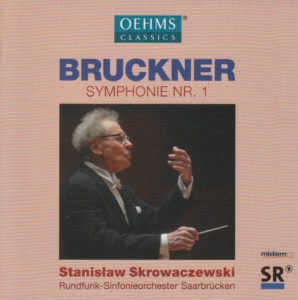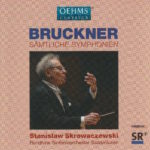 This morning’s conductor of Anton Bruckner’s Symphony No. 1 in C Minor (WAB 101) is Stanislaw Skrowaczewski (1923-), the famed Polish-born artist who even has a web site with a cool name: Seeking The Infinite, which is also the title of a biography about him. You can find it here.
This morning’s conductor of Anton Bruckner’s Symphony No. 1 in C Minor (WAB 101) is Stanislaw Skrowaczewski (1923-), the famed Polish-born artist who even has a web site with a cool name: Seeking The Infinite, which is also the title of a biography about him. You can find it here.
From his entry on Wikipedia:
Skrowaczewski was born in Lwów (then in Poland, now in Ukraine). As a child, he studied piano and violin; displaying talent on the piano at an early age, he made his public debut playing Beethoven’s Piano Concerto No. 3 in C minor. A hand injury ended his piano career.
After World War II, Skrowaczewski graduated from the Academy of Music in Kraków (in the composition class of Roman Palester and conducting class of Walerian Bierdiajew) and soon, in 1946, became the music director of the Wrocław Philharmonic, then the Katowice Philharmonic, the Kraków Philharmonic and finally the Warsaw National Orchestra. He studied composition with Nadia Boulanger in Paris. In 1956 he won the Santa Cecilia Competition for Conductors.
At the invitation of George Szell, Skrowaczewski conducted the Cleveland Orchestra. In 1960 he was appointed music director of the Minneapolis Symphony Orchestra (later renamed the Minnesota Orchestra under his tenure in 1968), a position he held until 1979 when he became conductor laureate. In 1981 the American Composers Forum commissioned the Clarinet Concerto which Skrowaczewski wrote for Minnesota Orchestra principal clarinetist Joe Longo, who premiered it in 1981.
Between 1983 and 1992 he was principal conductor of the Hallé Orchestra in Manchester.
Between 1995 and 1997, Skrowaczewski served as artistic advisor to the Milwaukee Symphony Orchestra. In 1988, he was composer-in-residence for the Philadelphia Orchestra’s summer season at Saratoga. He has guest-conducted that orchestra, and many others, all over the world.
His complete set of recordings of the symphonies of Anton Bruckner, made with the Deutsche Radio Philharmonie Saarbrücken Kaiserslautern, has received much acclaim, as has his 2005/06 complete Beethoven symphony cycle with the orchestra. Another noted recording is his Brahms Piano Concerto No. 2 with the London Symphony Orchestra in collaboration with soloist Gina Bachauer.
 And that’s just part of his gifted maestro’s life and accomplishments. There’s enough more to fill a very large biography (7 x 1.5 x 10 inches, 648 pages), which I just started reading.
And that’s just part of his gifted maestro’s life and accomplishments. There’s enough more to fill a very large biography (7 x 1.5 x 10 inches, 648 pages), which I just started reading.
About this morning’s recording, first the objective aspects:
This was recorded in 1995 at Kongresshalle Saarbrucken. Skrowaczewski was 72.
From the liner notes:
Stanislaw Skrowaczewski commands a rare position in the international musical scene, being both a renowned conducting figure and a highly-regarded composer. During his long and distinguished career, he has conducted all the top orchestras, and – in his 92nd year – he retains a busy schedule with guest engagements taking him across North America, Europe and Japan.
Bruckner wrote his symphonies in four parts. The time breakdown of this one (version unknown), from this particular conductor (Skrowaczewski) and this particular orchestra (Rundfunk-Sinfonieorchester Saarbrucken) is as follows:
Allegro…………..11:44
Adagio……………12:39
Scherzo……………8:35
Finale……………..13:14
I’ll compare Skrowaczewski’s interpretation to one from one of my favorite conductors so far: Jochum, from my post on 9 October 2016.
The timing breakdown from the Jochum interpretation (which used the Linz version) with orchestral performance by Staatskapelle Dresden was:
Allegro…………..12:29
Adagio……………12:38
Scherzo……………9:02
Finale……………..12:57
This tells me the Skrowaczewski interpretation of Bruckner’s Symphony No. 1 in C Minor is one lean, mean mo-fo. It is tighter than Jochum’s interpretation by 1:08. Every movement but the last is shorter. And the Finale is only larger by :16. This interpretation wastes no time. Adds nothing. Yet it doesn’t feel hurried.
Just for grins, I compared Skrowaczewski’s interpretation to Lorin Maazel’s, which I wrote about on October 11th. Check these numbers:
The timing breakdown of Bruckner’s First Symphony from Maazel (who also used the Linz version), from the Symphonieorchester des Bayerischen Rundfunks (the Bavarian Radio Symphony Orchestra), was as follows:
Allegro…………..15:19
Adagio……………12:43
Scherzo……………8:11
Finale……………..18:02
Maazel’s version is nearly nine minutes longer than today’s interpretation by Skrowaczewski.
Nine minutes! That’s like hearing one full movement more.
Why would you want to? When you can hear Skrowaczewski or Jochum present Bruckner without embellishment, why would you want to hear more from the conductor and/or orchestra?
Okay. Now, here are the subjective aspects:
My Rating:
Recording quality: 4
Overall musicianship: 5
CD liner notes: 3 (in German and English, include an essay about Bruckner’s symphonies, a short but interesting bio about Skrowaczewski, and the orchestra – but lacks technical/recording information for each CD; that’s found on the CD jackets. Also, deeply marring what is really a fine set of liner notes, there’s no mention of which versions Skrowaczewski used. Not one mention – for any symphony.)
How does this make me feel: 4
Overall, I found Skrowaczewski’s interpretation to be highly listenable. It wasn’t my favorite so far. But it’s extremely solid. I’d rate it in my Top Five to date, for whatever that’s worth. Remember: I’m not a musicologist. I’m just a guy who loves music.
